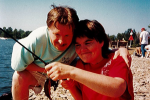The capacity to care is what gives life its deepest significance.
—Pablo Cassals
Shakespeare, in the classic Hamlet, says everything we need to know about the tension between what is goodness–and what is really goodness. In that play, Hamlet says, “A man can smile and smile and be a villain.” The insight, at first sight, seems obvious but the trick is to avoid the pitfall that comes with virtue gone bad.
The truth is that it’s always so easy to do what is “proper,” what is good. It’s easy to grandstand goodness, to put it on display for all the world to see, to use it to secure for ourselves the status, the patrons, the approval we seek. We’ve seen it done.
People who have no time for the elderly or the handicapped too often hasten to push wheelchairs in a crowd.
Politicians who take little time with their own small children, nevertheless thrive on kissing babies on greeting lines where the cameras click and the reporters use the shot to project the candidate as an icon of family values.
Some, wealthy beyond all imagination, rank as pillars of the community while they and their accountants play tax avoidance gains that leave the working-class citizens of the area without medical insurance, without day care centers, without .... The rich we call “generous” for their tax write-offs. The working class we call “lazy” for their failure to “get ahead” while they care for their families without help, without fair wage laws, without public support.
It’s called “posturing.”
When Ferdinand Waldo Demara, “The Great Imposter,” pretends to be a surgeon, his surgery is successful–but it is not goodness that drives him. It is the need to pretend to be something he was not.
When Fr. Mychal Judge, chaplain to the firemen but not a fireman himself, rushes into the chaos that was 9/11 and dies there in the midst of helping others, we see goodness, self-giving, compassion, generosity, raw and wonderful.
When the church protects pedophile priests in order to save the church rather than the children, the instinct may be understandable, but it is not right. When Jesuit Dan Berrigan spends years in jail for protesting nuclear weapons in order to call the attention of the country to the devastating effects of nuclearism on children everywhere, here as well as in war zones, goodness, generosity, love glowed into a flame seen round the world.
Down deep, we always know the difference between the good and the really good. Down deep we can always smell spoiled virtue even when we can’t see it. In a society thick with corporate wealth and poor on social services, we can see the distance between goodness and greatness, between compassion that is real and the kind of humanity that is rare.
Some apparent goodness is most self-serving; some goodness is simply light years beyond what anyone ought to expect. Some goodness is show and sham. Some goodness is a command performance. Some goodness is the grit and grain of the daily. In the long run, the difference always shows and the distance between them is legion.
Friday, July 1: Generosity is not the act of doing what we cannot do. It is the gift of giving what we have and giving it gladly.
Saturday, July 2: To be deeply spiritual, wholly compassionate, we must remember that the one in need is simply another version of ourselves which we may have yet to meet in life but someday surely will. Joy Harjo says it this way: “Remember that you are all people and all people are you.”
Sunday, July 3: If I have never known need, it is simply because I have not yet lived long enough.
Monday, July 4: It is easy to be religious; it is difficult to be spiritual. A religious life requires that we be just to the other. The spiritual life demands that we be compassionate to the other.
Tuesday, July 5: Even war is no excuse for the suppression of compassion. When we really care about others in wartime, we care as much about those we kill as we care about our own who die.
Wednesday, July 6: Compassion, to be real, must be universal, not selective. I cannot claim to be compassionate if I leave anyone outside the boundaries of my care. Madeleine L’Engle reminds us: “If you’re going to care about the fall of the sparrow, you can’t pick and choose who’s going to be the sparrow. It’s everybody.”
Thursday, July 7: “It is easy to love those who love us,” Jesus says. “Even the pagans do this.” The question is, How do I feel about people who do not love me? Ah, now that is the test.
Friday, July 8: The instinct to self-preservation is an important one. To a point. When the self becomes the only thing that counts, I have become an enemy, even of myself. “The fundamental delusion of humanity is to suppose that I am here and you are out there,” Yasutani Roshi writes. Whatever happens to you, to the world, will eventually happen to me. My self-preservation really depends on you.
Saturday, July 9: Only if my heart is large enough and my vision wide enough can I ever hope to be bigger than my own small agenda. Then, I have something worth living for, giving to, suffering with forever. Then I am a gift to the rest of humankind.
Sunday, July 10: We all perpetuate ourselves one way or another. What I want the world to be, I must begin to be myself so that others can see the good of it.
Monday, July 11: When we are consumed with the self, then we are most dangerous to the self. We cut ourselves off from the care and compassion, the joy and insight of others. We doom ourselves to a very small life.
Tuesday, July 12: “Good and evil lie close together,” Lord Acton wrote. Ask yourself why you really do the good you do and you will discover who you would be if you were alone on an island.
Wednesday, July 13: It isn’t what we have that is the measure of the self. It is what we do for others with what we have that really counts. As Pablo Casals reminds, “The capacity to care is what gives life its deepest significance.”
Thursday, July 14: Beware charity. If it is not driven by compassion it may be nothing more than pennies thrown in the face of the starving: a show to impress the masses rather than an energy the purity of which changes the world.
Friday, July 15: The basic human question is whether or not I have ever really cared for someone else, for their sake rather than my own, with no expectation of reward for the doing of it, with no need to have them even know it. If the answer is no, then I am still only in the process of becoming human.
Saturday, July 16: “If you find it in your heart,” Maya Angelou writes, “to care for somebody else, you will have succeeded.” Strange thought. How can that possibly be a measure of success. And why?
Sunday, July 17: Beware those who simply “contribute” to a project. It is those who believe in it that make the difference. “I hate the giving of the hand,” Ralph Waldo Emerson wrote, “unless the whole person accompanies it.”
Monday, July 18: Generosity is the part of being human that completes the creation of the world.
Tuesday, July 19: Compassion oils the soul of the human condition. It brings us into touch with one another, finds the light in each and magnifies it to the point that the world brightens with a new kind of understanding, a better kind of human community.
Wednesday, July 20: Knowledge does very little for the life. It is compassion that makes it livable, compassion that gives it the kind of vision that gives us all a reason to be alive. “Only those who have aims and ambitions for the benefit, not of the individual, but of humankind as a whole,” the 20th century Chinese writer Ding Ling wrote, “can persevere to the end.”
Thursday, July 21: The world will not heal itself. Only a compassionate heart can do that. “As human beings,” Arnold J. Toynbee wrote, “we are endowed with freedom of choice and we cannot shuffle off our responsibility upon the shoulders of God or nature. We must shoulder it ourselves. It is up to us.”
Friday, July 22: If the “general” good that politicians preach does not have a positive difference on individual lives, it is a sham and a scandal.
Saturday, July 23: In one of his books, E.M. Forster tells this story: She had been so wicked that in all her life she had done only one good deed--given an onion to a beggar. So she went to hell. As she lay in torment she saw the onion, lowered down from heaven by an angel. She caught hold of it. He began to pull it up. The other damned saw what was happening and caught hold on it, too. She was indignant and cried, “Let go--it's my onion,” and as soon as she said, “My onion," the stalk broke and she fell back into the flames. Each of us has at least one onion to give away for the benefit of another. The only real question is whether we intend to give it or not.
Sunday, July 24: It is not enough to know what must be done to make life better for us all. We must begin to do it with what we have and where we are. “The functions of intellect,” Dean Koontz wrote, “are insufficient without courage, love, friendship, compassion and empathy.”
Monday, July 25: No one of us is here for ourselves alone. That is the single most important lesson of life. “The true measure of your worth,” Cullen Hightower says, “includes all the benefits others have gained from your success.”
Tuesday, July 26: When we cut ourselves off from the rest of the human race, make ourselves a world unto ourselves, we lose contact with the gifts others have been born to give us. Then, ironically, we will never become really whole.
Wednesday, July 27: The difference between sympathy and empathy is not immaterial. Sympathy enables us to feel. Empathy requires us to act.
Thursday, July 28: Maybe we only think of care as a feminine virtue because it is so poorly paid.
Friday, July 29: It takes courage to care. To be open to the pain of others just might cause us to suffer, as well. “Virtue is bold,” Shakespeare says, “and goodness never fearful.”
Saturday, July 30: “Ye shall be as gods, knowing good and evil,” Genesis teaches. Ah, yes, but will we be good enough to confront evil or only to mollify it?
Sunday, July 31: All this talk about goodness get you down? Don’t worry; there’s an answer. I found a “Prayer Upon Waking.” It reads: “Dear God, so far today I’ve done all right. I haven’t gossiped and I haven’t lost my temper. I haven’t been grumpy, nasty or selfish, and I’m really glad for that. But in a few minutes, God, I’m going to get out of bed and from then on I’m going to need a lot of help. Thank you. Amen.”
Let’s Share Our Thoughts
The following discussion questions, Scripture echoes, Journal prompts, and prayer are meant to help you reflect more deeply on The Monastic Way. Choose at least two suggestions and respond to them. You may do it as a personal practice or gather a group interested in sharing the spiritual journey. Once a month The Monastic Way staff will convene a Zoom conference where you can share your insights. Three times a year Sister Joan Chittister will join that Zoom conference to give more input and respond to your questions and ideas regarding one issue of The Monastic Way.
Discussion Questions
1. Reread the reflection on July 16 and answer the question posed by Sister Joan, “How can caring possibly be a measure of success? And why?”
2. Which daily quote in The Monastic Way is most meaningful to you? Why? Do you agree with it? Disagree? Did it inspire you? Challenge you? Raise questions for you?
3. After reading The Monastic Way write one question that you would like to ask the author about this month’s topic.
4. Joan Chittister uses other literature to reinforce and expand her writing. Find another quote, poem, story, song, art piece, novel that echoes the theme of this month’s Monastic Way.
5. Take a few minutes to slowly read the suggested Prayer, Psalm 1, which describes a “good” person. Is there any line(s) in the prayer that gave you pause? If so, explain why.
Scripture Echo
A good tree cannot bear bad fruit, nor can a bad tree bear good fruit. Therefore, by their fruits you will know them.
—Matthew 7:18, 20
Jesus used this example when warning about following false prophets. A true prophet, he explained, is comparable to a good tree. A good prophet or a good person produces good fruit. Can you think of a person—living or dead—that meets this criterion? What “fruits” are evident in this person’s life?
Journal Prompts
Prompt 1. Here are a few statements from this month’s Monastic Way. Choose one that is most helpful to you and journal with it.
•My self is the only thing of value I really have to give away.
•The basic human question is whether I have ever really cared for someone else.
•Compassion, to be real, must be universal, no selective.
 Prompt 2: Spend a few minutes with this photograph and journal about its relationship to this month’s Monastic Way. You can do that with prose or a poem or a song or….
Prompt 2: Spend a few minutes with this photograph and journal about its relationship to this month’s Monastic Way. You can do that with prose or a poem or a song or….
Prayer
Blessed are the man and woman
who have grown beyond their greed
and have put an end to their hatred
and no longer nourish illusions.
But they delight in the way things are
and keep their hearts open, day and night.
They are like trees planted near flowing rivers,
which bear fruit when they are ready.
Their leaves will not fall or wither.
Everything they do will succeed.
—Psalm 1 (version by Stephen Mitchell)
JOAN CHITTISTER is an internationally known author and lecturer and a clear visionary voice across all religions. She has written more than 60 books and received numerous awards for her writings and work on behalf of peace and women in the church and in society.
KAREN BUKOWSKI, an Erie native, is a nature photographer and former LPGA and PGA Golf Professional who holds a master’s degree in public administration. Visit karenbukowskiphotography.com to find many nature and landscape photographs.

 Artwork: by Karen Bukowski
Artwork: by Karen Bukowski




